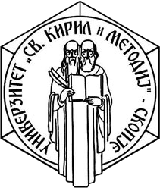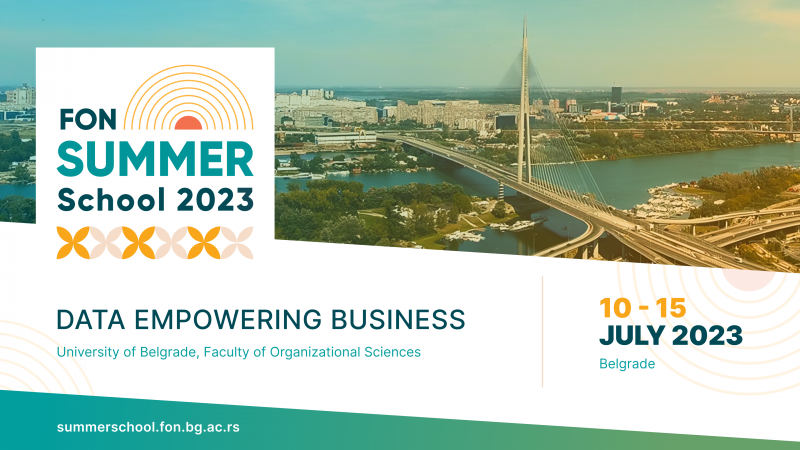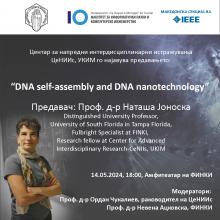Statistics for data analysis (3+1+1)
1. General Information
This program is designed to train staff with solid statistical knowledge with a focus on the newly recognized field of data science. The curriculum combines rigorous statistical theory with broader practical experience in applying statistical models to data work. Graduates will be in high demand. Most students are expected to be employed as statisticians, analysts and data experts within private and public institutions providing statistical consultations.
- Name of the proposer: University "Ss. Cyril and Methodius University in Skopje, Faculty of Information Sciences and Computer Engineering - FINKI
- Title of the study program: Second cycle academic studies in Statistics for Data Analysis
- Scientific-research area: technical-technological / natural mathematical
- Field: Informatics / Mathematics
- Areas: Mathematical Statistics and Operations Research, Data Processing, Applied Mathematics and Mathematical Modeling, Programming, Artificial Intelligence, Algorithms, Information Processing .
- The value of postgraduate studies is 120 ECTS credits.
- Duration of studies: 4 semesters .
- One academic year consists of two semesters lasting 30 weeks (1 semester = 15 weeks).
- Requirements for enrollment : according to the competition announced by the university, completed undergraduate studies in information science, computer or related fields with a minimum of 180 credits.
- Introductory Layer : The introductory layer is the first two semesters in which students are offered a set of differential introductory courses. After their successful realization, the student acquires the right to continue with the second year of postgraduate studies.
- Third semester: 3 Mandatory courses and 2 electives, one of which may be from the University list.
- Fourth semester : 1 Mandatory course and 1 elective course, the elective course can be from the University list (only if in the first semester the courses are selected at the Faculty level) and the final project - master's thesis from 18 ECTS.
- 1 ECTS credit corresponds to 30 hours of total work engagement.
- The number of contact hours is 4.
- The academic title or degree obtained upon completion of the studies is Master of Science in Information Science - Statistics for Data Analysis
Master of Science in Informatics - Statistics for Data Analytics
2. Introductory layer
The first year of study is the introductory layer for students whose studies lasted less than four years, ie students who gained 180 credits from previous studies. Students must pass differential exams that will enable them to enter the basics of mathematics and computer science needed to successfully complete their studies.
Table 1: List of subjects in the first year of study
| РБ | CODE / Subject | Semester | M / E | ECTS |
| 1 | Mandatory subject 1 from Table 2 | VII | M | 6 |
| 2 | Mandatory subject 2 from Table 2 | VII | M | 6 |
| 3 | Mandatory subject 3 from Table 2 | VII | M | 6 |
| 4 | Mandatory subject 4 from Table 2 | VII | M | 6 |
| 5 | Elective course 1 * | VII | E | 6 |
| 6 | Mandatory subject 5 from Table 2 | VIII | M | 6 |
| 7 | Mandatory subject 6 from Table 2 | VIII | M | 6 |
| 8 | Mandatory subject 6 from Table 2 | VIII | M | 6 |
| 9 | Elective course 5 * | VIII | E | 6 |
| 10 | Selection from the university list of free courses | VIII | E |
Elective courses can be selected from the proposed list of courses of the study program (Table 2), or from the proposed lists of courses from the introductory layer of other study programs of the Faculty of Information Sciences and Computer Engineering. The selection of courses should be made in accordance with the previous knowledge of the candidate and the necessary knowledge to continue with the postgraduate studies in statistics for data analysis. When choosing courses, the student should coordinate with the head of the study program. A free choice of subject is also allowed, which is on the university list of subjects for the first year of two-year postgraduate studies.
After the successful completion of all ten courses and 60 credits, the student with previously acquired 180 ECTS credits (or completed three-year studies) continues with the courses from the second academic year of postgraduate studies - Table 3 (III and IV semester).
* Selection from the lists of subjects from the introductory layer of all master studies at the Faculty of Information Sciences and Computer Engineering
Table 2: List of recommended courses in the first year of study
| РБ | New code / Subject | Semester | ECTS | |
| 1 | F18L1W011 Discrete Mathematics | VII / VIII | 6 | |
| 2 | F18L1S013 Calculus | VII | 6 | |
| 3 | F18L2W006 Probability and statistics | VII | 6 | |
| 4 | F18L3W035 Linear Algebra and Applications | VII | 6 | |
| 5 | F18L3W008 Introduction to Data Science | VII | 6 | |
| 6 | F18L3W161 Social Networks and Media | VII | 6 | |
| 7 | F18L3W108 Internet of Things | VII | 6 | |
| 8 | F18L3W004 Databases | VII | 6 | |
| 9 | F18L3W068 Computing in the Cloud | VII | 6 | |
| 10 | F18L3S036 Machine learning | VIII | 6 | |
| 11 | F18L3S150 Data Mining | VIII | 6 | |
| 12 | F18L3S163 Statistical Modeling | VIII | 6 | |
| 13 | F18L3S157 Data warehousing and analytics | VIII | 6 | |
| 14 | F18L1S023 Business Statistics | VIII | 6 | |
| 15 | F18L3W076 Introduction to time series analysis | VIII | 6 | |
Table 3: List of Postgraduate Courses in Statistics for Data Analysis
| РБ | CODE / Subject | Semester | M / E | ECTS |
| 1 | SNP-Z-1 Data analysis with statistical packages | IX | M | 6 |
| 2 | SDP-Z-3 Bayesian data analysis | IX | M | 6 |
| 3 | SDP-Z-4 Data preparation and research | IX | M | 6 |
| 4 | Elective item from Table 4 | IX | E | 6 |
| 5 | Elective item from Table 4 | IX | E | 6 |
| 6 | SNP-Z-2 Regression Models | X | M | 6 |
| 7 | Elective item from Table 4 | X | E | 6 |
| 8 | Master Thesis | X | M | 18 |
Table 3 lists the electives from the Statistics for Data Analysis study program. In addition to these courses, the student can choose from all elective courses, defined for all study programs, from the second cycle that are serviced by the faculty. It is allowed to choose one elective subject from the university list nand free electives.
Table 4: Optional list of offered items
| РБ | New code / Subject | Semester | ECTS | |
| 1 | Methods of statistical locking | IX | 6 | |
| 2 | Concepts and application of big data | IX | 6 | |
| 3 | Analysis and forecasting time series | IX | 6 | |
| 4 | Advanced algorithms | IX | 6 | |
| 5 | Modeling and fusing |
IX | 6 | |
| 6 | Information Processing in Biological Systems | IX | 6 | |
| 7 | Analysis of data from related systems | IX | 6 | |
| 8 | Text Data Processing | IX | 6 | |
| 9 | Optimization methods | IX | 6 | |
| 10 | Data processing in bioinformatics | IX | 6 | |
| 11 | Network Analysis | IX | 6 | |
| 12 | Ambiental intelligence | IX | 6 | |
| 13 | Web of the Future | IX | 6 | |
| 14 | Statistical Programming | X | 6 | |
| 15 | Statistical Learning | X | 6 | |
| 16 | Multidimensional statistical analysis | X | 6 | |
| 17 | Numerical methods for data science | X | 6 | |
| 18 | Statistical research skills: editing , reporting and visualization of data | X | 6 | |
| 19 | Business Analytics | X | 6 | |
| 20 | Random processes | X | 6 | |
| 21 | Big Data Modeling and Management | X | 6 | |
| 22 | Discovering knowledge in big graph data | X | 6 | |
| 23 | Open and related data | X | 6 | |
| 24 | Modern Simulations and Modeling | X | 6 | |
| 25 | Computational paradigms in the Internet of Things | X | 6 | |
| 26 | Data analysis from mobile sensors / sources | X | 6 | |
| 27 | Intelligent mobile applications | X | 6 | |
The student can choose a subject from the list of offered elective courses from all study programs of the second cycle of studies. The list of offered electives can be found on this link .




